- The IP Code (Decree Law 30 of 10 February 2005); and
- The Civil Procedure Code (as amended by Legislative Decree 149/2022).
- The EU Enforcement Directive (2004/48/EC);
- The EU Regulation on the Unitary Patent Court (UPC) (1257/2012); and
- The EU Regulation on Jurisdiction (1215/2012) (as amended, in relation to the UPC system, by EU Regulation 542/2014).
There are 22 Italian courts that specialise in corporate matters. However, if one of the parties is foreign, only 11 courts have the authority to interpret and enforce the patent. The court is composed of a panel of three judges. The patent holder can file an application for limitation of claims in one of two ways:
- in ordinary litigation in which the patent is enforced; or
- if there is no nullity litigation pending, before the Italian Patent Office.
In each case, the patent holder gives the patent a different scope of protection (each time narrowing it down compared to the original).
The specialised courts in corporate matters (see question 1.3). The maps below indicate where these specialised courts are located, both where:
- all the parties are Italian (first map); and
- one of the parties has its head office abroad (second map).
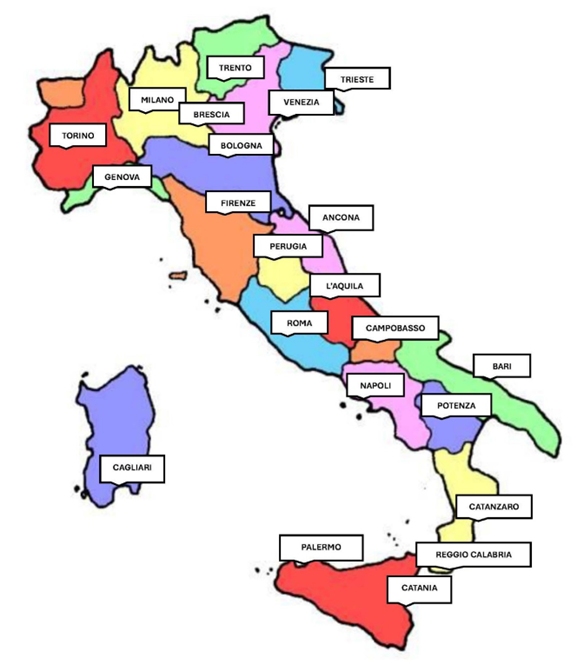
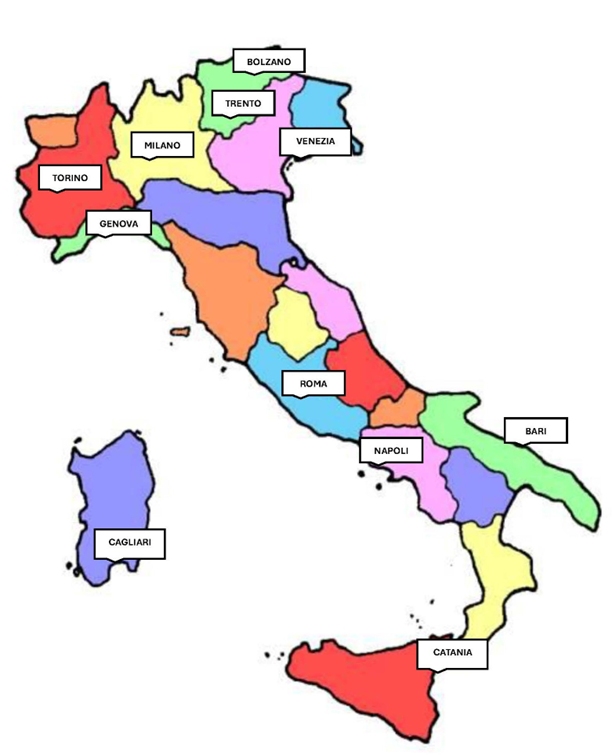
Patent infringement and validity can be decided in the same forum. If patent holder starts an infringement litigation, its counterpart may appear in the same proceeding and file a counterclaim of nullity of the patent. It is also possible that two different specialised courts may be seized for the same patent. For example, while a patent infringement case is pending before the Court of Rome (since the infringer is based in Rome or the infringement took place in Rome), the alleged infringer may start nullity proceedings before the Court of Milan (since the patent holder’s elected domicile when filing the patent was in Milan). Following such nullity litigation, the first infringing one should stay (Supreme Court Decision 8690/2022).
Litigation relating to preliminary injunctions is heard by:
- a single judge at first instance; and
- a panel of judges on appeal.
In ordinary litigation, the trial is heard by single judge but the decision is rendered by a panel of three judges.
An appeal is handled by a panel of three judges, one of whom has the role of judge rapporteur. In the very rare instance where there is a need for a trial phase before the parties are heard by the panel, the president of the panel will appoint a single judge for this phase according to Articles 349bis and 350 of the Civil Procedure Code.
There are opportunities for forum shopping in Italy. In particular, the following places may serve as an alternative to the place of domicile of the defendant:
- the place where the infringing activity occurred (‘infringing activity’ is the production, sale, offer to sale, promotion or advertising (even online) of the allegedly infringing product/service);
- if there is more than one defendant with a close link to each other, the place where one of the defendants has its head office; or
- if the defendant has no head office, domicile or seat in the national territory, the court of the place where the claimant has its head office.
The patent holder (case law confirms that each patent co-owner can individually sue for infringement), the exclusive licensee and the exclusive distributor have standing. Alternatively, any licensee and distributor may file suit where appropriately authorised to do so by the patent holder. But even in this case, the participation of the patent holder is preferable.
In terms of requirements or restrictions, it is preferable to:
- file the licence or distribution agreement or an extract thereof; or
- ask the patent holder to take part in the litigation.
Yes. If the place of infringement is also in Italy, the court at the place where the patent holder has its head office has jurisdiction. If the patent holder has no head office in Italy, the Court of Rome will have jurisdiction; or if a licensee has head office in Italy, the court at the place where licensee is located has jurisdiction (taking in consideration the maps in question 2.1). Even where an Italian judge has no jurisdiction, in some cases they may issue a preliminary injunction decision – especially in cases regulated by:
- Article 10 of Law 218/95 (and Article 669ter(3) of the Civil Procedure Code); and
- Article 35 of EU Regulation 1215/2012.
Italian case law also admits cross-border injunctions regarding patents.
Yes.
Both the demands and the defendants must be interrelated. ‘Interrelated’ in this context means that:
- the same patent is infringed; and
- there is a close and concrete relationship between the defendants, according to Article 33 of the Civil Procedure Code.
Yes. In starting an action for a declaration of non-infringement, a third party must prove its interest in acting – that is, that the patent holder has threatened its conduct (even through a warning letter or through litigation abroad for enforcement of a patent of the same family). In starting a nullity action, a third party can prove its interest in acting merely by virtue of being a (potential) competitor of the patent holder.
A nullity action is commenced by starting full-scale litigation before the court at the place where the patent holder has its elected domicile.
‘Infringing activity’ includes the production, sale, offer for sale, promotion or advertisement (even online) of the infringing product. It also includes the production of means related to an essential element of the patented invention which is necessary for its implementation in the territory of a state, if:
- the producer is aware of that destination; and
- the final product is produced or offered on sale in a country in which the invention is protected (Article 66(2)bis of the IP Code).
In the case of a process patent, ‘infringing activity’ includes:
- the performance of the patented process; and
- the production, sale, offer for sale, promotion or advertisement (even online) of a product obtained directly through the patented process.
Infringement is determined by proving that the infringer carried out an infringing activity (see question 4.1).
Yes. There are two approaches:
- the triple identity test or the function-way-result (FWR) test; and
- the insubstantial variation theory.
Both of these were quoted by the Supreme Court in its Decision 2977 of 7 February 2020. In particular:
- to ascertain infringement, the FWR requires a finding that the modified means:
-
- have substantially the same function in the context of the patent; and
- obtain the same result in the same way; and
- the insubstantial variation theory (applied by the Supreme Court in Decision 30943/2022) recognises infringement if the different solution used by the alleged infringer is obvious to the person skilled in the art. (In order to assess whether the contested implementation can be considered equivalent to the claimed one so as to constitute an infringement, it must be ascertained whether, in allowing the same final result to be achieved, it has an original character, offering a response that is not trivial or repetitive of the previous one, being qualified as such that which exceeds the skills of the average technician faced with the same problem, since in this case it can only be considered that the solution lies outside the idea of the protected solution.)
The specialised courts sometimes consider wilful infringement in quantifying damages. However, punitive damages are not applied, as stated by the Court of Turin in decisions issued on 8 June 2016 and 3 January 2017.
The patent holder can request:
- seizure of the infringing goods (Article 129 of the IP Code);
- a preliminary injunction in relation to any infringing activity (Article 131 of the IP Code);
- the withdrawal from the market of the infringing products;
- the destruction of the infringing goods and of moulds to produce the infringing goods (Article 124 of the IP Code); and/or
- publication of the decision in newspapers and magazines.
Interim measures are frequently available before receiving a ruling on the merits. A patent holder that lacks proof of infringement and that needs access to the infringer’s premises to acquire evidence can request a description (also ex parte) of:
- the infringing products and the relevant means of production; and
- any technical, commercial and accounting documents (Article 129 of the IP Code).
In ordinary litigation, the only limitation period is for damages and is five years from the date on which the patent holder was aware or should have been aware of the infringement.
No, this is not necessary. In the case of preliminary injunction proceedings, it is recommended to check that the contested conduct is continuing.
- The patent annuities must be paid regularly;
- The patent holder and/or the licensee/distributor should bring the claim (preferably together);
- The patent should be filed; and
- The infringement should be reasonably proved by evidence offered in and filed with the introducing brief, either in:
-
- a writ of summons in ordinary proceedings; or
- an application for a preliminary injunction in urgency proceedings.
The burden of proving the infringement rests with the patent holder. Following the recent modification of the Civil Procedure Code (Legislative Decree 149/2022) on 1 March 2023, when commencing ordinary litigation, the patent holder should provide sufficient evidence. This is even more so the case in preliminary injunction proceedings. However, if there is a lack of real evidence and only reasonable evidence is available, it may be possible to proceed by requesting an urgent description ex parte (see question 5.2).
The patent holder must file an application for description to obtain access (also ex parte) to a certain site – usually the premises of the alleged infringer or some other site, such as a booth at a trade fair – to describe and record:
- the contested object;
- all means used to produce the infringing product, including moulds and technical drawings;
- promotional materials;
- accounting documents, including invoices for sales of the contested product or purchases of raw materials used to produce the contested product;
- a list of suppliers and clients; and
- a sample of the contested product.
Patent litigation in Italy often begins with a preliminary injunction proceeding, followed by ordinary litigation. Interim remedies are also available during ordinary litigation but are less common.
Interim remedies are obtained by filing an application together with evidence that complies with the burden of proof for the patent holder (ie, that proves the infringement took place or has reasonably taken place).
Security for costs and/or damages is seldom requested or fixed by the court.
Information given by the patent holder to third parties can destroy novelty as pre-disclosure only if people that obtain the information can reproduce the teaching of the patent on their own. However, pre-disclosure does not invalidate the patent application if:
- it takes place within six months of the filing date of the patent application; and
- it is the direct or indirect consequence of a clear abuse against the applicant of such patent application (Article 47.1 of the IP Code).
Abuse occurs where:
- the invention is disclosed to third parties in breach of a non-disclosure agreement; or
- there is an implicit undertaking of secrecy – for instance:
-
- a violation of secrecy carried out by an employee (according to Article 2105 of the Civil Code, employees are bound to secrecy in relation to information owned by the employer and obtained due to their job); or
- during commercial negotiations (eg, for manufacturing a prototype), when some technical information is given by the disclosing party to the receiving party.
See question 6.2. In any event, if employees are bound to secrecy in relation to information obtained during their relationship with the company, it is recommended that they sign a non-disclosure agreement.
The burden of proving infringement falls on the patent holder, while the burden of proving invalidity falls on the alleged infringer which raises the demand or exception of nullity. In ordinary litigation, the documentary evidence and a request for deposition of witnesses must be filed with the second trial brief (to be submitted after the writ of summons for the plaintiff or the first defence for the defendant), according to Article 171ter of the Code of Civil Procedure. However, prior art that attacks the validity of the patent claimed to be null can be filed during the trial (in particular, during technical operations).
In addition to the evidence mentioned in question 7.1, as the judge has no technical background, they will normally appoint, as super partes, a court expert (generally a European patent attorney) who specialises in the specific field of the patent litigated. The parties are also entitled to appoint their own experts. The experts of the parties will file two or three sets of technical briefs and, subsequently, the court expert will file the draft of a technical opinion, subject to comments by the parties’ experts. After taking into account these comments, the court expert will file the final technical report with the judge.
Normally, written documents (not affidavits) are relevant. Witness depositions of witnesses are also relevant, but do not generally carry the same weight as documents. However, the probative value of these types of evidence may change on a case-by-case basis.
The burden of proving infringement falls on the patent holder, while the burden of proving invalidity falls on the alleged infringer which raises the demand or exception of nullity.
There are no dedicated hearings for claim construction in Italy. A court may conduct a claim construction-type discussion in a hearing – normally once the court expert has submitted their technical report or sometimes before in the case of a technical query.
Judges carefully evaluate the scope of the patent. In this regard, according to Article 52 of the IP Code:
2. The scope of protection is determined by the text of the claims. However, the description and the drawings shall be used to interpret the claims.
3. The provision set forth in paragraph 2 must be read so as to afford, at the same time, an equitable protection to the holder and a reasonable legal certainty to third parties.
3-bis. In determining the scope of protection conferred by the patent, due account shall be taken of any element equivalent to an element indicated in the claims.
In addition to the evidence outlined in question 7.3, the court considers the general common knowledge of the person skilled in the art. In certain cases, case law gives relevance to disclaimers or other declarations made by the patent holder, either before the courts (including in another jurisdiction) or before a patent office (in particular, arguments made by the patent holder during prosecution before the European Patent Office).
Yes, at any time during the litigation. However, on 13 November 2023, the Court of Appeal of Milan declared that this limitation should be carried out during the trial or immediately after, as if it is carried out close to the hearing of the final statement, it may be considered invalid as abusive conduct. Case law often holds that the amendment can be requested only in the context of an ordinary proceeding in which the validity of the patent is assessed.
The most relevant defences are:
- a request for nullity of the patent; and
- non-infringement.
Yes. It is compulsory to counterclaim, with the first brief to be submitted 70 days before the first hearing.
A valid patent is unenforceable if the defendant can prove, in relation to the contested products, that there has been an exhaustion of rights due to prior sale – in particular, in the case of parallel imports from EU countries.
Mediation and/or other forms of settlement discussions are not required in patent litigation in Italy.
According to Article 296 of the Civil Procedure Code, all parties to the case can request the judge to stay the claim only once, and for no more than three months. It is common practice in Italy, in case of negotiation, to request postponement rather than for the claim to be stayed.
It is good practice to communicate the results of the settlement discussions to the judge directly – in particular, to obtain the further postponement of the hearing in order to settle the litigation.
Normally, court proceedings are private in Italy and third parties are not allowed to attend most of the hearing, in particular during trials.
The timelines are outlined below.
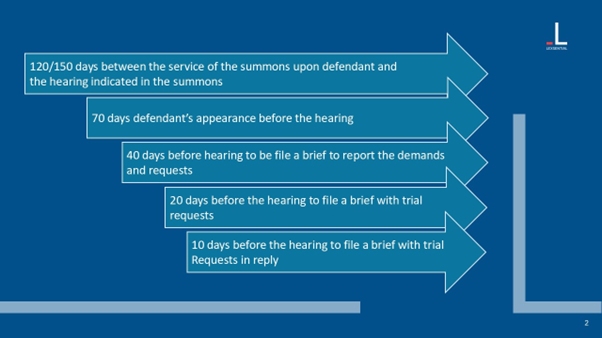
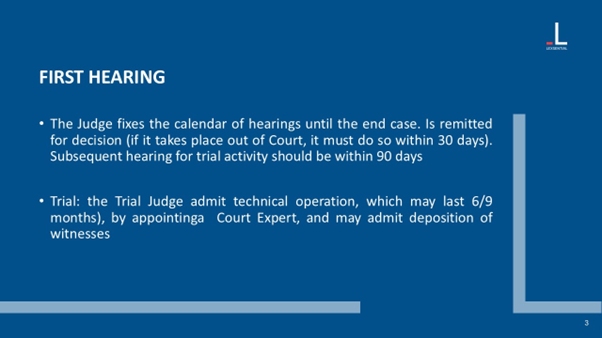
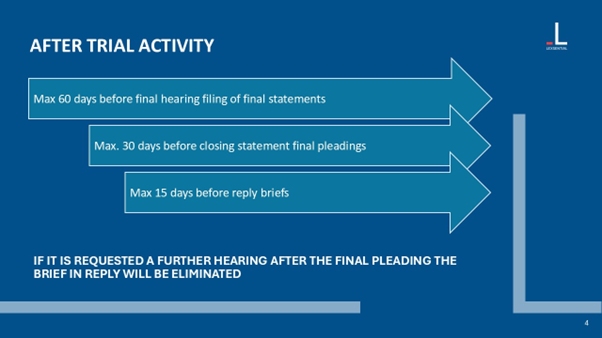
In an action for nullity and infringement, it takes around two to three years for a decision on infringement to be issued; and if the decision is favourable, it takes an additional two years to decide on damages. However, these timings can be quite unpredictable, as the duration:
- may change from court to court; and
- may also be affected by the application of new procedural rules.
UK and German decisions are taken into account as an element of proof. However, Italian judges refrain from fully relying on these decisions – not least as it may be possible that decisions from these jurisdictions in relation to the same patent may conflict.
A patent holder can request:
- seizure of the infringing goods (Articles 129–130 of the Civil Procedure Code);
- an injunction on infringing activity (Article 131 of the Civil Procedure Code);
- withdrawal from the market of the infringing products (Article 124 of the Civil Procedure Code);
- destruction of the infringing goods and of moulds to produce them (Article 124 of the Civil Procedure Code);
- publication of the decision in newspapers and magazines (Article 126 of the Civil Procedure Code); and
- damages (Article 125 of the Civil Procedure Code).
There are no punitive damages in Italy (Court of Appeal of Turin, 30 October 2017, 1221/15); but in case of wilful infringement, the court may increase the damages awarded. In certain cases, the court has considered an increase in reasonable royalties or liquidated damages corresponding to the benefit obtained by the infringer, extending the damages to include not only net profit, but also gross margin (Appeal Court of Bologna, 27 January 1996).
According to Article 125 of the IP Code, there are three possible criteria to quantify damages:
- compensation for damages, calculated as:
-
- loss of profits;
- possible real or actual damage; and
- in appropriate cases, immaterial damage;
- compensation for damages calculated on an equitable basis as, at a minimum, the royalty that the infringer would have paid to obtain a licence; and
- restitution of the profits obtained by the infringer.
Yes. First-instance decisions can be challenged before the competent court of appeal according to Article 342 of the Code of Civil Procedure. An appeal against a first-instance decision must be filed:
- within 30 days of service of the decision; or
- where there is no service of the decision, within six months of publication of the decision.
If the appeal is clearly ungrounded, the court seized may rapidly fix a hearing and pronounce orally that the appeal should be dismissed.
The timeframe for appeal proceedings is outlined below.
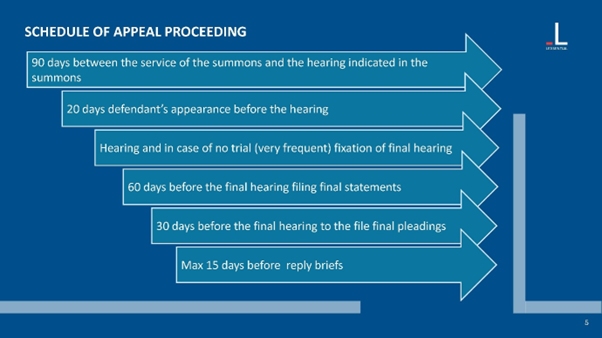
The decision of the court of appeal can be further appealed to the Supreme Court in cases involving:
- national and international jurisdiction;
- violation of law;
- nullity of the appealed decision; or
- lack of examination of an essential fact discussed by the parties. However, this ground for appeal will not apply if both the first and second-instance courts evaluated the same essential facts in the same way.
The appeal must be filed:
- within 60 days of service of the decision; or
- where there is no service of the decision, within six months of publication of the decision.
It is extremely difficult to predict the average time for each level of appeal due to the very recent modification of the procedural rules. In particular, these may change from court to court. At the Milan Court of Appeal, an appeal takes around two to three years; whereas this is normally shorter in Turin.
A Supreme Court appeal can take between three and four years, although this is expected to become quicker as a result of the modification of the procedural rules.
Patent litigation normally involves both infringement and validity issues. The costs may differ significantly on a case-by-case basis – generally, pharmaceutical cases are more complicated – and the number of patents litigated may also have an impact on costs. This is why normally, in first-instance patent litigation, the legal fees may vary from $60,000 to $100,000, and sometimes even higher.
About 20% to 40% of the winning party’s costs can be recovered.
No, but it is possible to calculate the fees based on the economic interest or the result expected by the party (ie, on the basis of the claims of the action or the value of the subject matter). In addition, it is possible to agree, in writing, on a determined fee (added to the ordinary fee) that is due only if the outcome is favourable to the client.
Yes, it is permitted, but there are no specific applicable legislative or regulatory provisions.
As there are no specific norms on litigation funding, the general civil laws of contracts (in particular, mortgage and insurance contracts) will apply. Moreover, the assignment of the position of one party in litigation may not be precluded.
The new procedural rules illustrated in question 11.2 should speed up proceedings.
Let us consider two scenarios here:
- A patent holder intends to commence litigation; and
- An alleged infringer expects to be sued.
In both cases, it is better to be prepared in advance. In the former case, the patent holder should:
- be aware that it may be attacked with a nullity action in relation to its patent;
- choose from its portfolio the most appropriate patents to enforce (and consider whether to proceed first with a limitation of the Italian portion); and
- evaluate the pros and cons of enforcing one or more patents in a single litigation.
In the latter case, the alleged infringer should obtain an opinion from a patent attorney:
- which should entirely support the demands (of invalidity and lack of infringement); and
- with all documents to be submitted in the litigation, including affidavits.
In particular, in the case of preliminary injunction proceedings, the defendant may have only 10 to 15 days to appear and prepare its defence and file all necessary documents.




